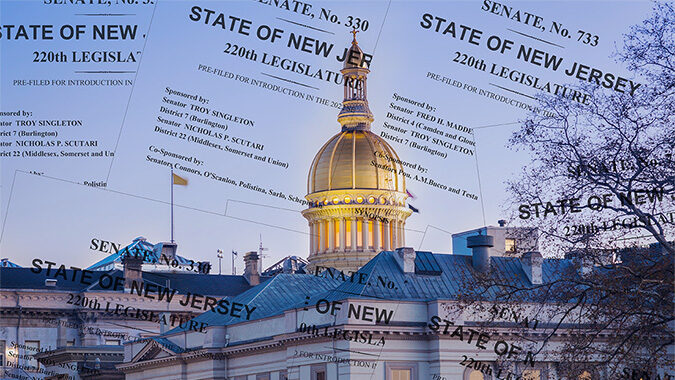Out of Gov. Phil Murphy’s proposed $48.9 billion budget for FY23, only 0.1% will go toward relief for small businesses – at a time when they can really use it. Which is why NJBIA is advocating for lawmakers to provide more help to small business through legislation during the budget process.
NJBIA Vice President of Government Affairs Christopher Emigholz will testify before the Assembly Budget Committee on Monday.
“We would like to see more business relief in the budget, especially after what businesses have endured over the past couple years of COVID-19,” Emigholz said. “There is $50 million in the budget that goes toward the Main Street Recovery Finance Program – but that’s a very small percentage of the state budget and it’s really only for smaller businesses who are leasing new space or adding capital costs.”
Particularly striking for the business community is the proposed ANCHOR Property Tax Relief Program. It will bring $900 million in property tax relief for certain residents and renters. But it offers no relief to business owners, which pay nearly half of New Jersey’s property taxes.
But Bill S-330 (Scutari, D-22; Singleton, D-7) would help reduce property taxes by increasing distribution to municipalities from the Energy Tax Receipts Property Tax Relief Fund. The good news: it’s already been passed by the full Senate.
“Basically, it would provide property tax relief for residents AND businesses by increasing the amount of funding distributed to municipalities from the Energy Tax Fund,” Emigholz said.
“And it would require a corresponding reduction in the municipal property tax levy to ensure the tax relief is reflected in the property tax bills paid by businesses and residents.”
Emigholz said the legislation would recapture more than $330 million of lost municipal aid. Last year, New Jersey businesses paid $14.9 billion in property taxes, out of $31.7 billion in total state and local taxes.
“The $330 million distributed amounts to about a 1% reduction in total statewide levy of more than $31 billion,” he said. “There are very few opportunities for the Legislature to reduce property taxes by 1%. This is their chance.”
Of course, one of the biggest and latest hits for New Jersey businesses is a nearly $1 billion tax hike over three years to replenish the state’s Unemployment Insurance Trust Fund, which was depleted by the pandemic.
But bill S-733 (Madden, D-4; Singleton, D-7) would simultaneously save employers more than $300 million in unemployment insurance tax increases, as well as pay off a federal UI loan to avoid any unnecessary interest payments.
“When you’re talking nearly $1 billion in new taxes, that is indeed an additional burden for New Jersey businesses,” Emigholz said. “And the sad part is that tax increase was only because businesses were forced to shut down – and it’s not a tax on income, assets, corporate profits wealth. It’s a tax strictly on jobs.
“At a time when we want to recover jobs, we should not be making job creation and retention less affordable.”
Here is how it would work:
New Jersey businesses are currently paying $252 million in additional taxes in FY22 to replenish the state’s depleted UI Trust Fund. In FY23, that number will increase by $296.6 million, for a total increase of $548.6 million compared to what employers paid in UI payroll taxes before the pandemic.
Under the bill, the $336.4 million UI tax increase in FY24, would be eliminated by blocking increases in the columns that determine payroll tax rates.
Twenty states used federal CARES act money to replenish their UI funds in whole or in part, and 18 states used federal American Rescue Plan Act (ARPA) money for the same purpose. But New Jersey did not, despite the support of it from lawmakers on both sides of the aisle.
The bill would also allocate some of the remaining New Jersey recovery funds to pay down a federal debt to ensure that state UI funds remain solvent during the pandemic. The federal government waived interest on loans through most of the pandemic, but only recently began charging interest again.
“New Jersey is now paying millions of dollars in interest to the federal government while we sit on billions of dollars from the federal government,” Emigholz said. “It would be like putting money under your mattress instead of paying credit card bills to avoid unnecessary and cumbersome interest.
“Paying off this loan sooner will also speed up the fund’s replenishment, and potentially improve its health more quickly and reduce a steep payroll tax down the road.”




